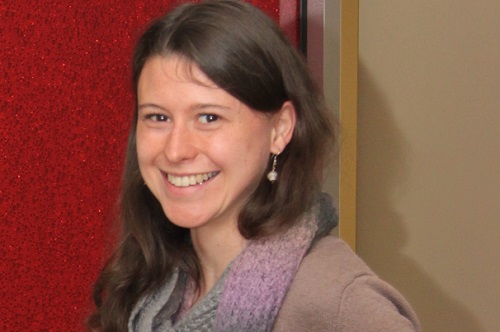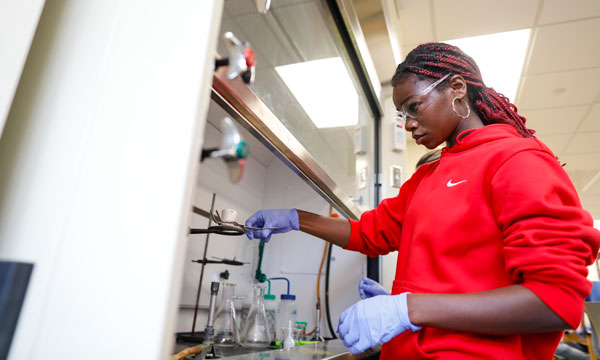Chemistry
Fuel Your Curiosity and Study Chemistry
Discover a captivating career in chemistry. Earn your bachelor’s degree (B.A. or B.S.) to dive into the field, prepare for graduate school, or matriculate into a health professional program. Cultivate your scientific prowess, fuel your ambition, and be mentored by caring professors anchored in Christian faith. Become ready to lead and launch a career in chemistry.
Visit Us
Ready to take the next step? Sign up for a visit! Call us at 585-594-7612 or schedule online.
Get More Info
4 Year Promise
At Roberts, we are committed to giving you a head start in earning income and achieving your personal goals by helping you graduate in four years. In fact, we guarantee it.
Program Highlights
PREPARE FOR YOUR CAREER
Practice your skills through internships, research projects, and service learning.
RESEARCH IN CUTTING-EDGE LABS
Get hands-on experience in a state-of-the-art laboratory.
FIND YOUR PEOPLE
Find like-minded friends who share your love for chemistry and Christ.
STORIES LEADING THE WAY

Rachel Hutchinson ‘17 (Chemistry) graduated from the Chemistry program and now works as a post-doc at the University of Wisconsin-Madison’s Food Science Department.
She shares, “At Roberts, my professors were concerned not only about my academic success but also my well-being and growth. They were extremely supportive, caring, and always willing to take time to answer questions and meet with me one-on-one. Their support, encouragement and commitment helped me to persevere through challenges and be successful.”
What Will I Learn
This major will prepare you for a career in chemistry, biochemistry, health science professions, chemical education or engineering, and secondary education.
The B.A. degree program provides a broad foundation. It’s recommended for students pursuing industrial employment, pre-health professions, or certification for secondary education.
The B.S. degree program dives deeper into academic study. It’s recommended for students who wish to pursue graduate studies or industrial employment.
Both majors take foundational courses such as:- General, organic, and analytical chemistry
- Introduction to research and scientific communication
- Instrumental analysis
- Thermodynamics
- Quantum mechanics
- Medicinal chemistry
- Advanced inorganic chemistry
- Nanoscience

Career Outlook
Internships
- Roberts Wesleyan University
- University of Rochester
- Yale University
- Harvard University
- Kodak
- Vaccinex
- Rochester General Hospital
- Strong Memorial Hospital
- Unity Hospital
- Monroe County Crime Lab
Careers
- Physician Assistant
- Chemical Engineer
- Research Chemist
- Polymer Chemist
- Pediatric Medicine
- Forensics Technician
- Physician
- Pharmacist
- Optometrist
- Research Laboratory Technician
- Professor
- High School Teacher
Graduate Schools
- Massachusetts Institute of Technology
- Clarkson University
- University of Rochester
- Rochester Institute of Technology
- University of Buffalo
- Daemon University
- Syracuse University
- Lake Erie College of Osteopathic Medicine
- Saba University School of Medicine
- Albany Medical College
- University of Georgia
- University of Wisconsin-Madison
- Nova Southeastern Universityu
Frequently Asked Questions
Chemistry is the study of matter – including how compounds and elements are structured and how they interact with each other.
A Chemistry degree from Roberts will consist of courses like Organic Chemistry, Introduction to Research & Scientific Communication, and Instrumental Methods of Analysis. Along with traditional course settings, you’ll gain experience in the lab, get practicum experience, and have the chance to undergo an independent study.
According to the US Bureau of Labor Statistics, chemists “research and analyze the chemical properties of substances to develop new materials, products, or knowledge.”
A biology degree opens doors to a wide variety of careers*, like:
- Physician Assistant
- Research
- Emergency Management Specialist
- Pediatric Medicine
- Pharmacist
- Optometrist
- Research Laboratory Technician
- Pharmaceutical Manufacturer
- Forensics Laboratory Technician
*Some may require further education post-bachelors degree.
According to the U.S. Bureau of Labor Statistics, the median annual wage for chemists and materials scientists in 2021 was $79,760.
It’s important to note, though, that some of these jobs have more advanced degrees.
Naturally, the numbers will differ by area, field of chemistry, company, and position
Yes! If you come to campus for an individual visit, you can meet individually with a professor to get an overview of the major and your individual questions answered. Our Discovery Day events typically include a Faculty & Services Expo, where you can meet your future professors.
We are committed to helping students meet the financial obligation to earn a degree and advance a career. Our Office of Student Financial Services works to assist all students in their effort to maximize financial aid. We award financial assistance to 100% of our undergraduate students.